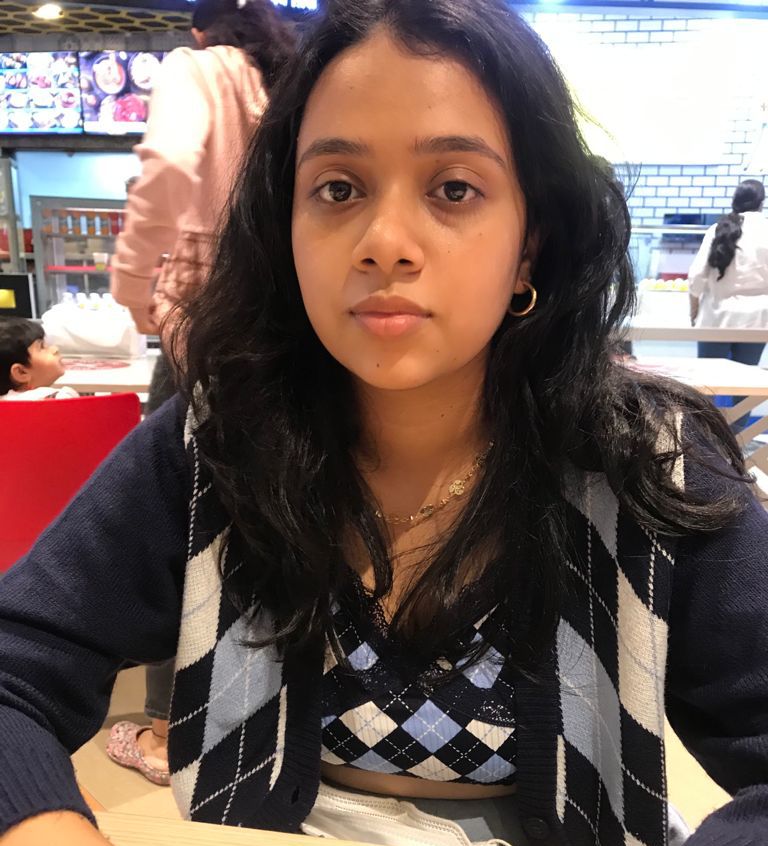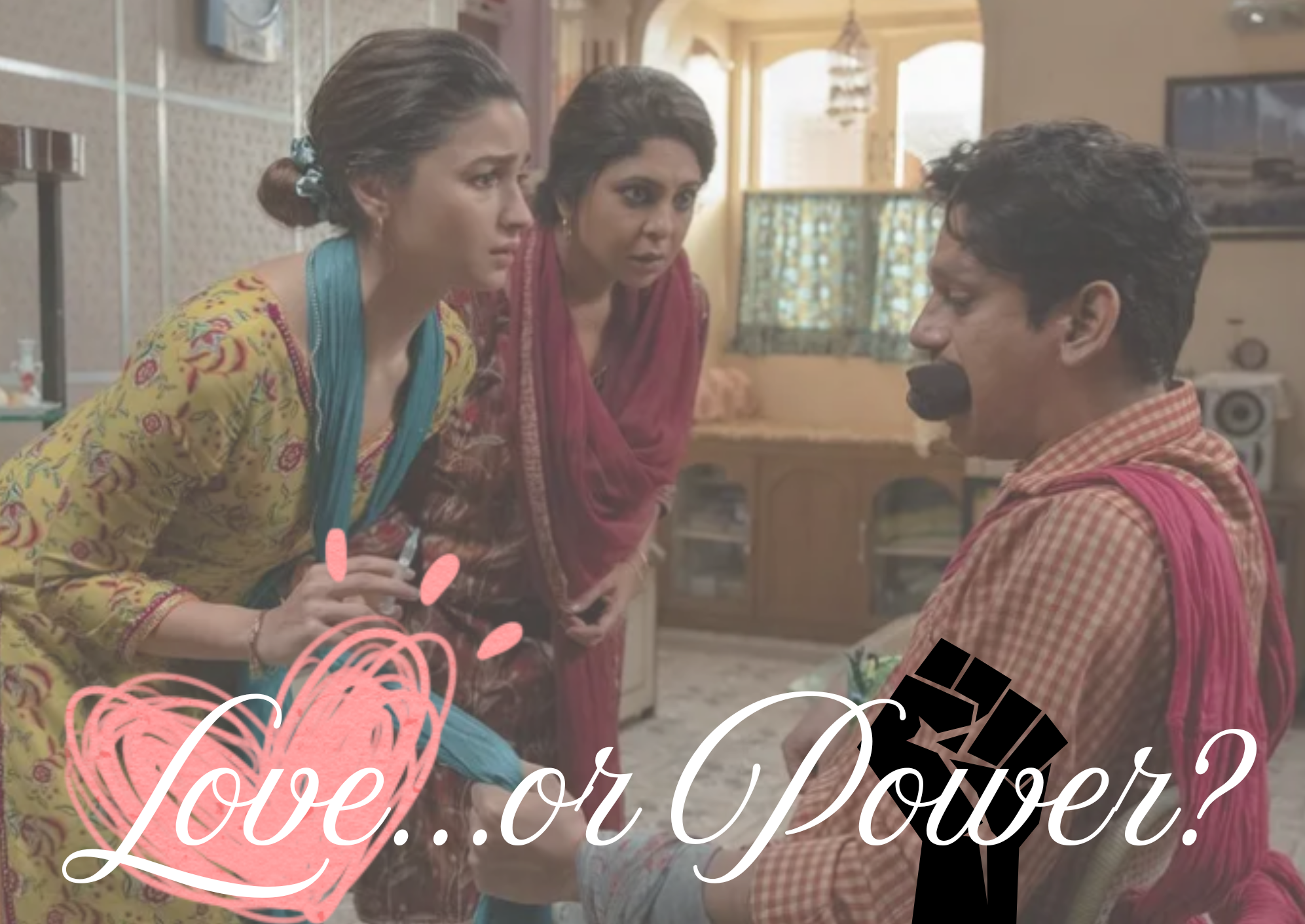Written by: Aaryake Pandey

I grew up hearing stories about demons who have three legs and eight eyes, who would only come out at night if you did something they didn’t like. But what happens when the demon in your life is human and someone you love?
The movie “Darlings” starring Alia Bhatt, Shefali Shah, and Vijay Verma, explores the theme of domesIc violence and addiction. It intertwines the lives of several characters, offering a thought-provoking reflection on human nature and the intricacies of modern life. It has been described as a dark comedy, where a woman is out to seek revenge on her abusive, alcoholic husband after tolerating years of domestic abuse.

Patriarchy, or “the rule of the father”, is a social system where men control the most of the economic, social, and political power. It is a system that enforces gender inequality between men and women, where being feminine is seen as weak and undervalued, where people won’t take you seriously. In contrast, being masculine is how one maintains their status and privilege. However, a ‘masculine woman’ will sIll be looked down upon and shamed for not having any “lady-like” traits. Why? Because this is a man’s world, where women must adhere to these rules and do what is asked of them.
Coming back to the movie, Hamza (the husband) is portrayed as sole earner of the household, he was shown as more powerful, dominant, assertive, and confident about himself to the extent that he thought punching his mother-in-law in the face was justified. He took being “man of the house” very seriously, the only decisions he “allowed” his wife to make were about what she would cook for their next meal; she had the soft, submissive, nurturing role in the household. Hamza controlled decisions both within and outside the home. For example, in the whole situation with the builders, he warned his wife to not get involved, as he would take care of it and also got into a fight over this. He had a problem with the fact that she had her own aspirations and wanted a better lifestyle for them, making comments like, “you want a high-five life but can’t even clean the bowls properly.”
Bell Hooks’ concept of love, which she describes as an acIon, a deliberate decision, and a practice rather than just a feeling or emoIon, states that it requires an ongoing effort, dedication, and connection with others while opposing oppressive and dominating structures. It should provide people the freedom to be who they truly are, follow their passions, and oppose force and control. “Care, Affection, Recognition Respect, Commitment, Trust, Honest and Open communication” are all components of love. It promotes the development of solid connections between people while opposing repressive structures and advancing individual as well as collective independence. According to her, love should motivate people to fight for oppressed communities, solve systemic injustices, and create a society that is more equal and just.
The movie opposes everything Bell Hooks believe in. In Love, Badrunissa and Hamza’s relationship shows how Badrunissa constantly forgives her husband for mentally, physically, and emotionally abusing her, cooking him breakfast every morning as though he hadn’t beaten her blue and black the night before. Every day, she hoped for him to change, doing everything she could to find a way to improve him, whether it was her crushing pills in his food to help him with his addiction or by trying her best to get pregnant to put a stop to it because she believed becoming a father will fix all their problems. But for Hamza love was more about possession, he was jealous, suspicious, and had a strong dislike for Zulfi who did odd jobs around the area they lived in. Zulfi frequently visited her mother’s house to sell kitchen appliances and was aware of the abuse and torture that Badrunissa suffered. Hamza went as far as to ask Badrunissa who the father of the child. After finding out that it was Zulfi was the one who filed a complaint against him for being abusive towards Badrunissa. He suspects them of having an affair (which they were not) and this eventually leads to an argument between the couple and him throwing her out of the house and down the stairs, causing her to have a miscarriage.
It seemed like the idea of his wife having an affair didn’t bother him because he loved her so much, but because it made him look like “less of a man,” which hurt his ego and would make him look weak, ultimately questioning his masculinity. Hamza’s manipulation defined their relationship. He took zero responsibility for his actions and said things like “lord, slay this demon inside me” after noticing the strangulation marks, he left on his wife from the night before. He always blamed the alcohol for his acIons or made statements like
“Which married couple doesn’t fight, everyone has their ups and downs?” as if it’s not a big deal when questioned or given the ‘silent treatment’ by his wife the morning after. He tried to woo her by passing flirtatious comments while she cooked for him and tried to provide reasoning for all the times he had beaten her up. However, his “true demon” that was inside him was shown in the scene where he pushed his pregnant wife down the stairs, while he was not under the influence of alcohol and completely sober, clearly showing that alcohol was never the problem.
All these experiences fueled a cycle of trauma and dysfunction, a horrifying display of control through abuse, devoid of genuine care and respect for one another in a relationship, with the same love that was never reciprocated. He would put up a show of a caring husband every morning. But the love in this relationship was marked by the suppression of individual agency where love that should foster personal freedom and autonomy did not exist, boundaries were over-looked and he treated his wife like a “punching bag”; quoting Badrunissa’s mother after she saw the bruises left on her daughter’s body.
Was Badrunissa an ideal victim married to an ideal offender? She is a woman who lives in a patriarchal society in India where men usually see marriage as permission to do whatever they want to their wives. Crimes like marital rape and domestic violence are not a surprising concept anymore especially when it involves a young, vulnerable, and naive woman like Badrunissa, who chose to have a love marriage. Given her socioeconomic background and societal factors like stereotypes, victim blaming, and gender constructs, being a vicIm of this abuse did not come off as a shock to those living around her, including her mother. Her mother would often question, “what did you do now?” insinuating that it was Badrunissa’s fault, that she provoked him or done something wrong to cause her husband to react and assault her. As though, of course, someone like “her” would be going through such difficult experiences.
Neighbors and those around were aware of the abuse going on at home, but no one really stood up or did anything to provide help, again reflecting the concept of attribution error, where the victim is being blamed for provoking the violence and that she probably deserved it. For example, the lady running the salon downstairs who could hear the entirety of the altercation proceeded to make comments like “last time it happened because of stones” once again insinuating that she probably did something wrong again and is bearing the brunt of it.
Ironically enough, another example is when Hamza escapes and runs to the police station to ask the officers for help, explaining how he is being tortured by his wife and mother-in-law but no one believes him because he’s not viewed as an “ideal victim”, based on societal stereotypes and biases. They probably assumed it was the alcohol’s fault and he is now making up stories because how can a man like him given his history and current state as he seemed drunk have possibly gone through the torture, he states he has?
The film premise showcases the protagonist through the lens of a victim who belongs to a social structure that perpetuates male tyranny, and finds herself at the receiving end of misogynistic patterns of her alcoholic and abusive spouse and struggles to make decisions against him even though he has brought her so much pain and agony. Despite vowing to treat her husband the same way he had treated her, Badrunissa’s love for him still lingered. She still fed him while she had him tied to a chair, she hesitated with the idea of killing him over the train tracks and eventually untied him, because the point of this was to teach him a lesson and not become like him. However, Hamza in his rage and spite, attempting to kill his wife for all the torture ends up being run over by a train, detailing how he planned to kill her just as he had killed their unborn daughter..
It took for Hamza to die for Badrunissa to finally live a free happy and independent life, looking forward to a better future. But what if Hamza didn’t die that day? Would she have ever forgotten to live a stress-free and happy life without worrying about him coming back to take his revenge?
Another shocking revelation that was made towards the end of the movie was that even Shamshunissa (the mother) was a victim of domestic abuse and had killed her husband. This cycle of abuse and trauma is prevalent in our society, making me wonder – how can one escape it? How does one break free from this vicious cycle?
It is almost every other day we hear about a new case related to domestic abuse. It has become so common that it no longer bothers people; they turn the other way. My question is, are these the consequences of love one must suffer in the flawed and imperfect world we live in.